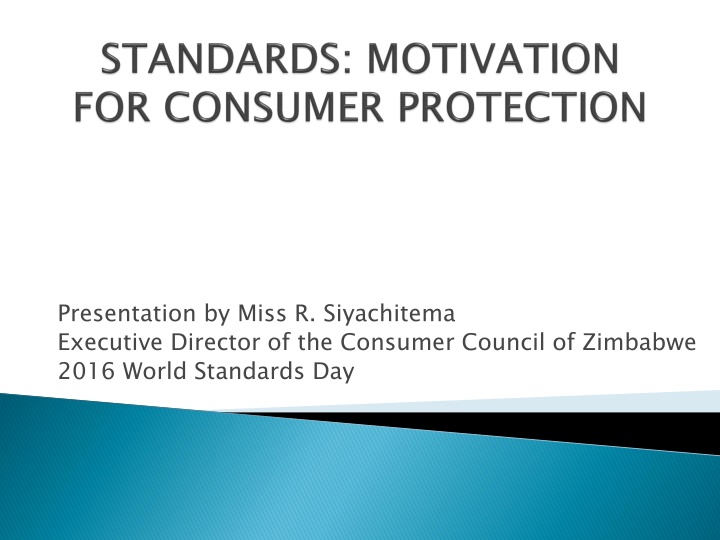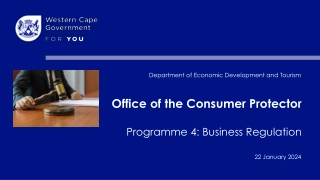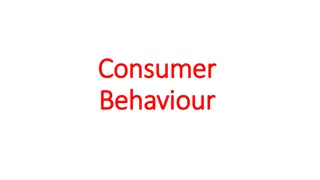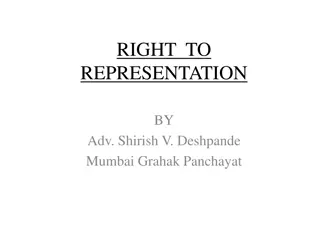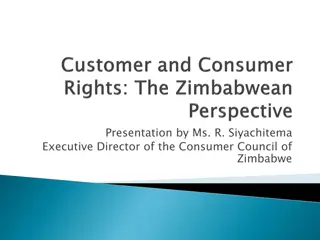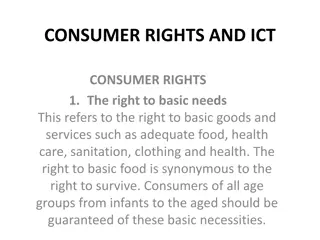Consumer Rights and Standards: Empowering People Around the World
Empower yourself with knowledge on consumer rights and standards, essential for making informed choices and ensuring safety in products and services. Explore how UN guidelines shape consumer protection policies and the impact of standards on daily life. Discover the fundamental consumer rights and their significance in today's global economy.
Download Presentation

Please find below an Image/Link to download the presentation.
The content on the website is provided AS IS for your information and personal use only. It may not be sold, licensed, or shared on other websites without obtaining consent from the author.If you encounter any issues during the download, it is possible that the publisher has removed the file from their server.
You are allowed to download the files provided on this website for personal or commercial use, subject to the condition that they are used lawfully. All files are the property of their respective owners.
The content on the website is provided AS IS for your information and personal use only. It may not be sold, licensed, or shared on other websites without obtaining consent from the author.
E N D
Presentation Transcript
Presentation by Miss R. Siyachitema Executive Director of the Consumer Council of Zimbabwe 2016 World Standards Day
The UN Guidelines for consumer protection is a declaration of best practices in consumer protection law and policy. The guidelines are not binding, but do provide a set of basic consumer protection objectives upon which governments have agreed, thereby serving as a policy framework for implementation at a national level. Whilst directed primarily at governments, some provisions of the Guidelines are also directed at businesses.
Consumers by definition, include us all, Kennedy said in his congregational statement, they are the largest economic group affecting and affected by almost every public and private economic decision. Yet they are the only important group.....whose views are often not heard . Over time, the consumer movement has developed this vision into a set of eight basic consumer rights that now define and inspire much of the work CCZ do.
The Right to: 1. Satisfaction of basic needs 2. Safety 3. Be Informed 4. Choose 5. Be heard 6. Redress 7. Consumer Education 8. A healthy environment
Standards are everywhere and affect people everyday. From our mobile phones, our electrical gadgets and the cars we drive are all made of specific standards that help to ensure that they are easy to use, work properly and are as safe as possible. Standards don t just deal with products, services such as healthcare, tourism, energy providers, banking and insurance are also covered by standards that deal with issues such as staff training and qualification, information provision, customer service, complaints handling and billing.
Standards are important to everyone as they protect and give information that is needed to make informed choices. Standards help to make products and services: a. Safer reducing accidents and saving lives. For example, by setting minimum standards for products such as electrical appliances. b. Better quality improving levels of customer service e.g. by giving guidance to companies or service providers about how to produce clearer bills or handling complaints effectively. c. Easier to use by ensuring that products and services are accessible to all consumers (including the elderly and people living with disabilities)
A standard is a document that sets guidelines and good practice for organisations and manufactures to follow. It is arrived at by consensus specifying characteristics for a product, process or service . Standards are knowledge, they are powerful tools that productivity. can help drive innovation and increase Standards make organisations more successful and people s everyday lives easier, safer and healthier.
Services good quality customer service and complaints handling Wellbeing safety of products and services and those related to health Inclusivity the accessibility of products and services, fair treatment of all consumers regardless of age, disability or personal circumstances. Sustainability making sure that products and services minimise their impact on the environment and the world around them. Security, privacy and identity the protection of personal information and financial details in public places and online.
Standards cover a wide range of subjects from construction to nanotechnology, from energy management to health and safety. They can be very specific, such as to a particular type of product, or general such as management practices. The point of having a standard is to provide a reliable basis for people to share the same expectations about a product or service and this helps to: a. Facilitate trade b. Provide a framework for achieving economies, efficiencies and interoperability c. Enhance consumer protection and confidence
Standards are tools that play a key role in consumer protection and in contributing sustainability. ISO 26000 recognises consumer issues as one of the essential elements of social responsibility. Elements such as fair marketing practices, the protection of consumers health and safety, sustainable consumption and access to essential services are embedded within the heart of the standard.
The CPA is meant to: Be as comprehensive as possible to ensure that regulators, legislation and policy do not perennially play catch up Create a platform wherein business practices operate from a standard in relation to consumer rights. Be alive to the emerging markets and technologies with the view of protecting the consumer. Encourage competition, while simultaneously discouraging market domination bordering on monopolies. Pay particular attention to the services sector, ensuring that the sector adheres to consumer friendly modes of operation. 14
The Consumer Protection Act is also meant to: 1) Ensure that the consumer is aware of his/her responsibilities. .. 2) Mandate consumer education and this entails consumer education [e.g. by the CCZ, SAZ, government departments such as health, ICT e.t.c] 3) Encourage the dissemination of information using various platforms such as the electronic and print media, leaflets and billboards as well as educational programs in schools ...e.t.c] 4) Facilitate frameworks for regional and international cooperation in the area of consumer protection, particularly in this era of regional integration and globalisation. 5) Ensure policies are in tandem with international trade obligations.
